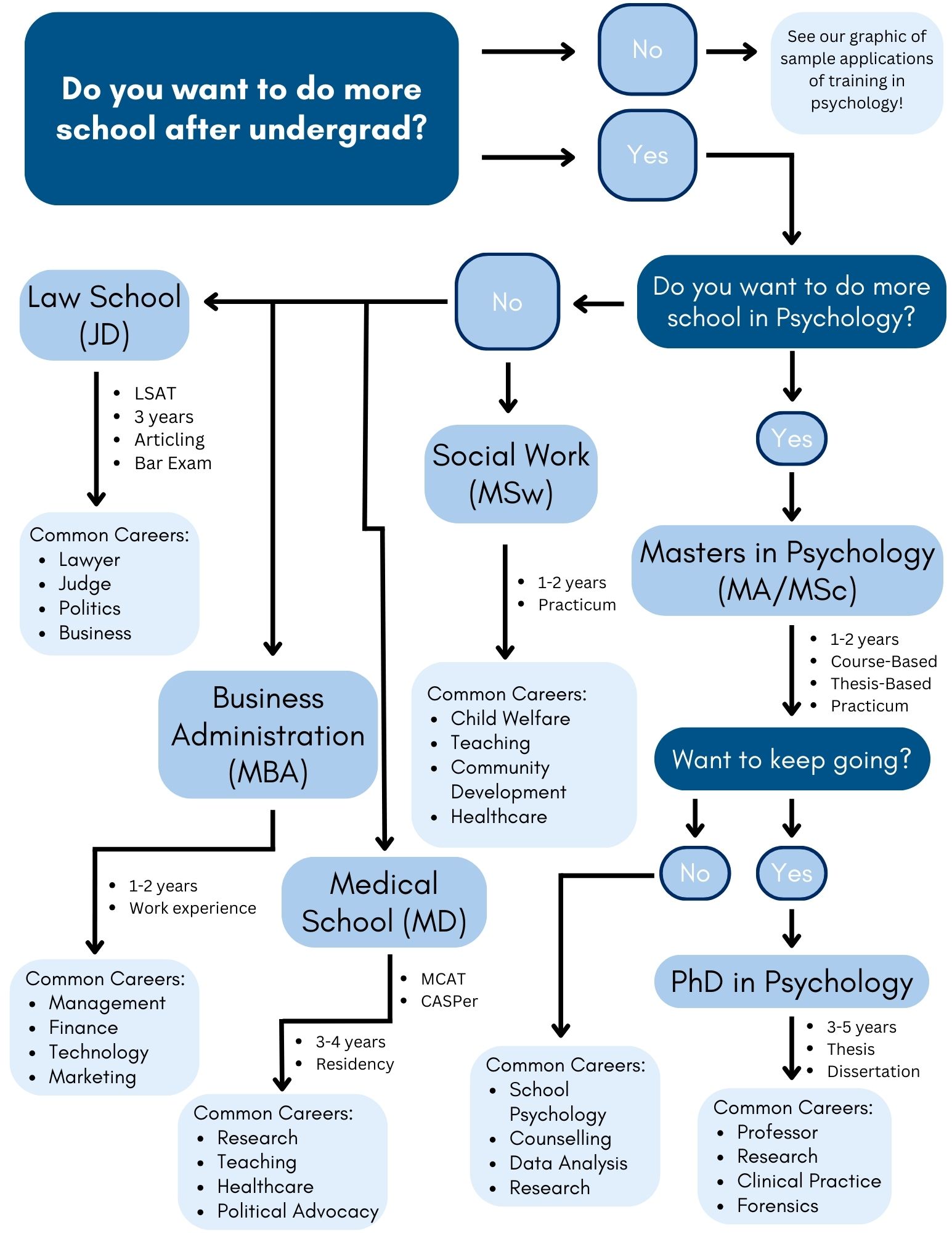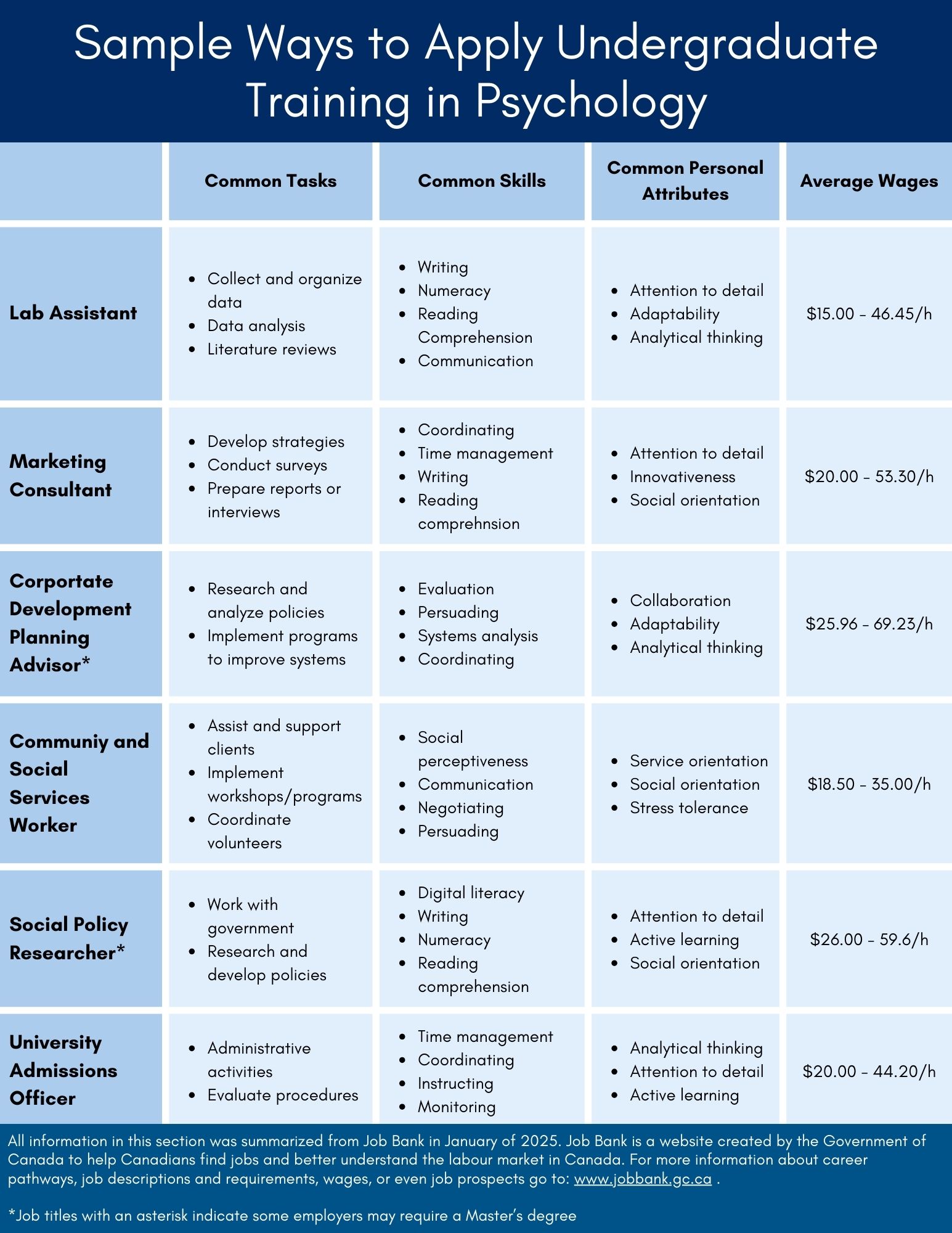What career pathways do students take from psychology undergraduate programs?
Many students are surprised to learn that undergraduate training is not prescriptive for one job path. Indeed, the Higher Education Quality Council of Ontario (HEQCO) analyzed data from the Canadian Household Survey (2011) regarding individuals’ undergraduate education and their current careers. Generally, this analysis demonstrated that no field of study in university has only one possible career path for graduates to follow, and students with a specific background tend to go on in varied paths. For example, those who reported studying within the fields of law, social sciences, or behavioural sciences in university were employed in a wide range of industries including business, finance, administration, policy, and program officers (HEQCO, 2015). HEQCO made a very helpful tool to help students visualize the many potential paths available to them, and you can access this here: https://heqco.ca/edudata-where-graduates-work/
Although it can be reassuring to know that there are many pathways available, we know from psychology that too much choice can be hard! Our intention in this next section is to open ideas related to career choices. An important consideration for potential pathways is whether you would like to pursue additional training beyond your undergraduate degree. We have created a flow-chart, provided below, that explores some career pathways based on whether you would like to pursue additional training. Please note that the flow chart illustrates only some of the potential education pathways for those with training in psychology. As you respond “Yes” or “No” to the questions provided, the chart provides you with potential advanced degrees (e.g., Masters of Social Work), the requirements to be completed in the progress of obtaining this degree (e.g., 1-2 years of school and a practicum), and potential job opportunities that may be pursued upon degree completion (e.g., child welfare, community development). This flowchart is not exhaustive. Our aim is to provide examples to help readers consider pathways that might not be readily apparent.

Figure 2
Flow chart: Considering undergraduate training in psychology for post-graduate training
If you are considering graduate training in psychology, please be aware that not all programs are reputable. This is an important consideration: it is up to you to determine if your program meets the standards to which you aspire, and whether your program meets registration requirements if applicable. The Canadian Psychological Association maintains a list of Clinical graduate programs that it has accredited, and we share that here in case it is helpful: https://cpa.ca/accreditation/cpaaccreditedprograms/
Not every career path requires additional training!
Undergraduate training in psychology provides a strong base for pursuing further training, but it also provides a strong base for transitioning directly into the workforce! Students develop many relevant and tangible skills throughout their undergraduate degree that are of interest to potential future employers and equip them to excel in several different work environments. Some of these skills include critical thinking, written communication, problem solving, interpreting research, and gaining an understanding and insight into behaviour (Norris & Herrewynen, 2023).
Just as with the flowchart above, we hope to provide students with information to help them consider just some of the career pathways available to students with undergraduate degrees in psychology upon graduation. The chart below includes examples of careers that are relevant for individuals with an undergraduate degree in psychology, and it includes some details pertaining what these jobs may entail, the skills and personal attributes that are frequently sought, and the average salary in Canada associated with these careers. Information in this chart was summarized from Job Bank, a central database created and maintained by the Government of Canada (https://www.jobbank.gc.ca/).

Figure 3
Sample Ways to Apply Undergraduate Training in Psychology

